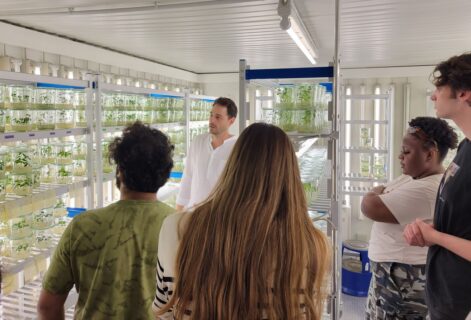Visit from the Fachoberschule 2 Nuremberg
On July 23, a class from the Fachoberschule Nuremberg visited the Chair of Biochemistry. The students are already preparing for their seminar papers in the upcoming school year around the topic “Sustainable Innovations: The Role of Genetic Engineering in Environmental Protection and Resource Conservation” and hoped to gain insights into our daily research work.
The visit began with presentations by Dr. Christian Lamm and Lisa Koch. While Dr. Christian Lamm introduced the Cassava Source-Sink Project and illustrated how genetic engineering methods can be used for genetic modification and genome editing of cassava, Lisa Koch presented current results from her doctoral thesis: The PhD student showed how potato yields decline under high temperatures, a problem exacerbated by additional nitrogen fertilization. A possible solution could be an artificially increased expression of the gene SP6A, which is involved in tuber formation, allowing tubers to form even under such conditions.
Subsequently, the students had the opportunity to get a taste of laboratory life during a tour of the department and, for example, to see the various stages of the genetic transformation of cassava live. In the molecular biology laboratory, Dr. Lamm demonstrated how plasmid DNA digested with restriction enzymes can be separated by size using an agarose gel. The tour ended in the greenhouse, where different experimental plants could be observed.
Finally, a discussion round on the seminar topics of the students, the possibilities and limitations of genetic engineering in general, as well as its social and legal context concluded the visit.

